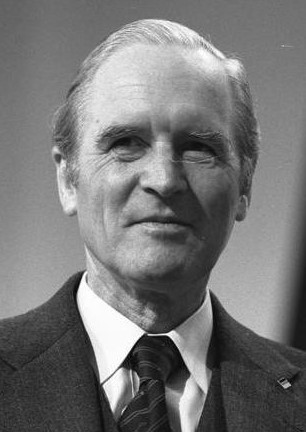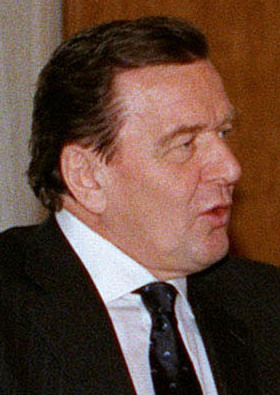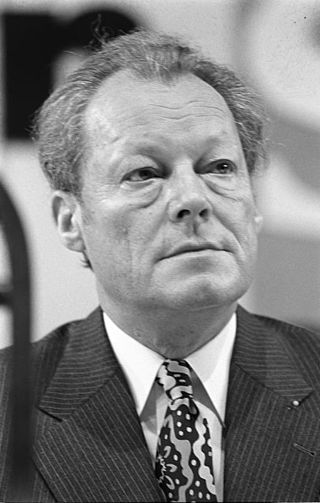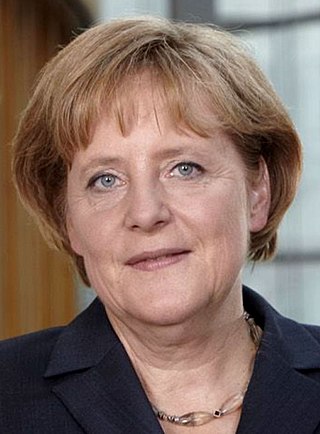
The Free Democratic Party is a liberal political party in Germany.

Germany is a democratic and federal parliamentary republic, where federal legislative power is vested in the Bundestag and the Bundesrat.

The Christian Democratic Union of Germany is a Christian democratic and conservative political party in Germany. It is the major catch-all party of the centre-right in German politics.

Karl Carstens was a German politician. He served as the president of West Germany from 1979 to 1984.

Federal elections were held in Germany on 22 September 2002 to elect the members of the 15th Bundestag. Incumbent Chancellor Gerhard Schröder's centre-left "red-green" governing coalition retained a narrow majority, and the Social Democratic Party (SPD) retained their status as the largest party in the Bundestag by three seats.

Federal elections were held in Germany on 27 September 1998 to elect the members of the 14th Bundestag. The Social Democratic Party (SPD) emerged as the largest faction in parliament for the first time since 1972, with its leader Gerhard Schröder becoming chancellor. The Christian Democrats had their worst election result since 1949.

Federal elections were held in Germany on 16 October 1994 to elect the members of the 13th Bundestag. The CDU/CSU alliance led by Helmut Kohl remained the largest faction in parliament, with Kohl remaining Chancellor in a narrowly re-elected coalition with the Free Democratic Party (FDP). This elected Bundestag was the largest in history until 2017, numbering 672 members.

Federal elections were held in Germany on 2 December 1990 to elect the members of the 12th Bundestag. This was the first all-German election since the Nazi show election in April 1938, the first multi-party all-German election since that of March 1933, which was held after the Nazi seizure of power and was subject to widespread suppression, and the first free and fair all-German election since November 1932. The result was a comprehensive victory for the governing coalition of the Christian Democratic Union/Christian Social Union and the Free Democratic Party (FDP), which was reelected to a third term. The second vote result of the CDU/CSU, 20,358,096 votes, remains the highest ever total vote count in a democratic German election.

Federal elections were held in West Germany on 6 March 1983 to elect the members of the 10th Bundestag. The CDU/CSU alliance led by Helmut Kohl remained the largest faction in parliament, with Kohl remaining Chancellor.

Federal elections were held in West Germany on 3 October 1976 to elect the members of the 8th Bundestag. Although the CDU/CSU alliance became the largest faction in parliament, Helmut Schmidt of the Social Democratic Party remained Chancellor.

Federal elections were held in West Germany on 19 November 1972 to elect the members of the 7th Bundestag. In the first snap elections since the resumption of democratic elections in 1949, the Social Democratic Party became the largest party in parliament for the first time since 1930, winning 230 of the 496 seats. The coalition with the Free Democratic Party was resumed.

Federal elections were held in West Germany on 14 August 1949 to elect the members of the first Bundestag, with a further eight seats elected in West Berlin between 1949 and January 1952 and another eleven between February 1952 and 1953. They were the first free federal elections in West Germany since 1933 and the first after the division of the country.

Federal elections were held in Germany on 18 September 2005 to elect the members of the 16th Bundestag. The snap election was called after the government's defeat in the North Rhine-Westphalia state election, which caused them to intentionally lose a motion of confidence to trigger an early federal election. The outgoing government was a coalition of the centre-left Social Democratic Party of Germany (SPD) and Alliance 90/The Greens, led by federal Chancellor Gerhard Schröder. The election was originally intended for the autumn of 2006.

Federal elections were held in Germany on 27 September 2009 to elect the members of the 17th Bundestag.

An indirect presidential election was held in Germany on 23 May 2009. The president of Germany is elected by the Federal Convention, which is made up of the members of the Bundestag and an equal number of members elected by the state parliaments.

An indirect presidential election was held in Germany on 30 June 2010 following the resignation of Horst Köhler as president of Germany on 31 May 2010. Christian Wulff, the candidate nominated by the three governing parties, the Christian Democratic Union, the Christian Social Union of Bavaria and the Free Democratic Party, was elected president in the third ballot. His main contender was the candidate of two opposition parties, the Social Democratic Party and the Alliance '90/The Greens, independent human rights activist Joachim Gauck.

An early indirect presidential election was held in Germany on 18 March 2012, the last possible day following the resignation of Christian Wulff as President of Germany on 17 February 2012. Joachim Gauck was elected on the first ballot by a Federal Convention, consisting of the 620 members of the Bundestag and an equal number of members selected by the states of Germany based on proportional representation.

Federal elections were held in Germany on 24 September 2017 to elect the members of the 19th Bundestag. At stake were at least 598 seats in the Bundestag, as well as 111 overhang and leveling seats determined thereafter.

Stephan Weil is a German politician and the leader of the Social Democratic Party in Lower Saxony. On 20 January 2013, the SPD and the Green party won the 2013 Lower Saxony state election by one seat. On 19 February 2013, he was elected Minister President of Lower Saxony with the votes of SPD and Alliance '90/The Greens. From 1 November 2013 until 31 October 2014 he was President of the Bundesrat and ex officio deputy to the President of Germany. In November 2017, he was again elected Minister President with the votes of SPD and CDU.

An indirect presidential election was held in Germany on 13 February 2022 to elect the next president of Germany.





















